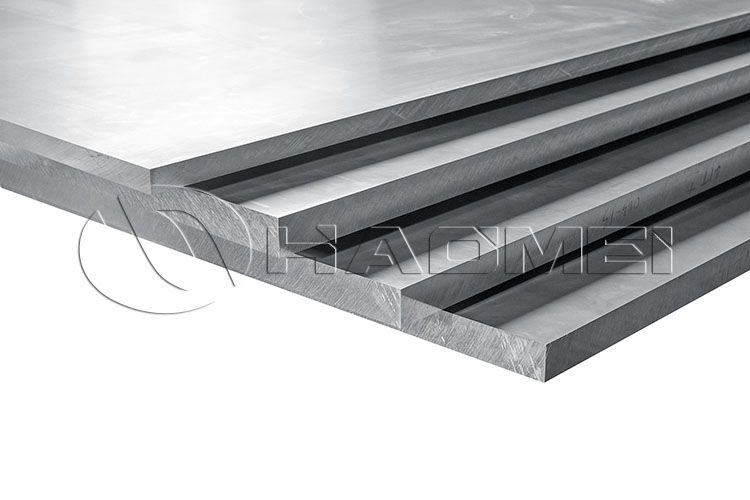
7075 aluminum plate belongs to the Al-Zn-Mg-Cu series of super-hard aluminum. It has been used in the aircraft manufacturing industry since the late 1940s and still occupies an important position in the aviation industry and other fields.

High Strength and Good Toughness: AA7075 t7351 has high strength, with tensile strength typically reaching a certain level, meeting numerous strength-demanding applications. It also possesses excellent toughness, resisting brittle fracture when subjected to significant external impact, maintaining structural integrity.
Excellent Machinability: This aluminum alloy exhibits excellent machinability. Both cold and hot working processes can be performed smoothly. For example, during machining, it can be precisely machined into various complex shapes through turning, milling, and drilling, resulting in excellent surface quality. This is due to its uniform microstructure and moderate hardness.
Excellent Corrosion Resistance: 7075 T351 exhibits excellent corrosion resistance under normal conditions. The combination of its alloying elements and heat treatment process allows it to form a dense oxide film on its surface. This film effectively blocks the intrusion of corrosive media, protecting the metal within and extending the service life of components.
Stress relief properties: The T351 state means that the material has been pre-stretched to eliminate internal stress. This greatly improves the dimensional stability of the material during subsequent use, and it is not easy to deform due to the release of internal stress, which is crucial for some applications that require extremely high dimensional accuracy.
Aerospace field: In aerospace fixtures, 7075 T351 aluminum alloy is widely used. Many parts of aircraft, such as wing structures and fuselage frames, are made of 7075 T351 aluminum alloy. These parts need to have high strength to withstand various complex stresses during flight, and good toughness can prevent brittle failure in harsh environments such as high altitude and low temperature. Its excellent processing performance can meet the processing requirements of complex shapes of aviation parts, and the stress relief characteristics ensure the dimensional stability of parts during long-term use, ensuring flight safety.
High-end machinery manufacturing: In the manufacturing of high-end machinery and equipment, such as key parts of precision machine tools and structural parts of industrial robots, 7075 T351 aluminum alloy is also often used. Machine tool components require high precision and stability, and the performance of 7075 T351 aluminum alloy precisely meets these requirements, ensuring that machine tools maintain accuracy during high-speed operation and long processing times. Industrial robot structural components must maintain sufficient strength while minimizing weight to enhance mobility and energy efficiency. The high strength and relatively light weight of 7075 T351 aluminum alloy make it an ideal choice.
High strength and good plasticity: The aluminum alloy in the 7075 T4 temper has high strength. Although the strength value may be slightly different from that of T351, it can still meet the strength requirements of many engineering applications. At the same time, it has good plasticity after solution treatment, which allows the material to be processed into various complex shapes through forging, extrusion, stretching and other processes during the forming process, and it is not easy to have defects such as cracks during the processing.
Good mechanical properties: The aluminum alloy in this state has good comprehensive mechanical properties. In addition to strength and plasticity, its hardness, wear resistance and other properties are also excellent. In some application scenarios that need to withstand friction and wear, the 7075 T4 aluminum alloy can rely on its good wear resistance to ensure the long-term stable operation of parts.
Ordinary corrosion resistance: The 7075 T4 aluminum alloy has ordinary corrosion resistance and can resist a certain degree of corrosion in general atmospheric environments and conventional industrial environments. However, compared with T351, its corrosion resistance may be slightly inferior, but its corrosion resistance can be further improved through appropriate surface treatment, such as anodizing.
Automobile manufacturing: In the automotive industry, 7075 T4 aluminum alloy is often used to manufacture some key parts of automobiles, such as automobile wheels, engine parts, etc. Automobile wheels need to have a certain strength and good plasticity to ensure that they will not break when bearing the weight of the vehicle and various impact forces during driving. At the same time, good plasticity is conducive to the forging and forming of the wheel.
Engine parts, such as pistons and connecting rods, have high requirements for material strength, wear resistance and lightness. 7075 T4 aluminum alloy can reduce the weight of the engine and improve the fuel economy of the car while meeting the strength and wear resistance.
Sports goods manufacturing: In the field of sports goods, 7075 T4 aluminum alloy is also widely used. For example, golf club shafts, bicycle frames and other products are often made of 7075 T4 aluminum alloy. Golf club shafts require high strength and good elasticity, and 7075 T4 aluminum alloy meets these requirements, allowing the club to produce appropriate elastic deformation when hitting the ball, improving the impact. Bicycle frames, on the other hand, need to be as light as possible while maintaining strength. The performance characteristics of 7075 T4 aluminum alloy enable the manufacture of strong yet lightweight bicycle frames, improving riding comfort and speed.
Original Source:https://www.aircraftaluminium.com/a/7075-t351-vs-t4.html
Tags: 7075 aluminum plate ,
Contact Us